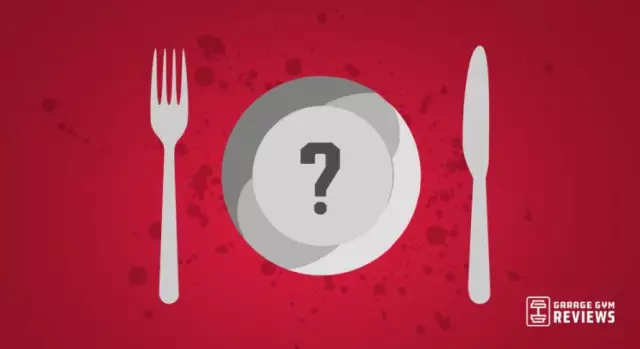- Author Rachel Wainwright [email protected].
- Public 2023-12-15 07:39.
- Last modified 2025-11-02 20:14.
Types of diets

Diet - a special regimen and diet that determines the amount of food, its chemical composition and physical properties, as well as the methods of cooking food and the intervals of food intake; nutrition that is appropriate for gender, age, lifestyle, profession, health status of a person and ensures the achievement of goals.
The complex definition of a simple term makes it clear that diet is a way to achieve a specific goal by changing the diet. The variety of goals determines many types of diets. What are the principles behind diet options? What types of diets are the most effective? What types of diets are there?
Basic types of diets: classification principles
Any of the diets is followed for a specific purpose: improving the body, preventing the development of diseases, correcting weight and body shape. Depending on the goal pursued, there are two main types of diets:
- Therapeutic diets used to correct the patient's conditions and symptoms in order to improve the body's health;
- Diets for the correction of body shape and weight.
The therapeutic type of diets is also called medical tables. Such diets are developed by nutritionists and are prescribed based on functional, metabolic, pathomorphological, enzyme and other disorders in the body. The medical type of diets creates the most favorable background for therapy, helping to enhance the effect of drugs, providing a therapeutic effect, and also helping to avoid side effects from the gastrointestinal tract. Therapeutic diets are prescribed to prevent the transition of some diseases from acute to chronic forms.
Diets for the correction of body weight and shape can be aimed at both losing weight and achieving an aesthetically pleasing relief, as well as gaining weight.
According to the compliance period, fast diets and long ones are distinguished. The fast type diet usually combines diets followed for no more than 5 days, while long-term diets are followed for 3 weeks or more.
By restricting the diet, the following types of diets are distinguished:
- Diets that limit the amount of food consumed - reducing the usual diet without changing the menu;
- Calorie restricting diets - exclusion of high-calorie foods from the diet;
- Diets that limit food intake - a special type of diet based on the observance of intervals between meals (fractional meals);
- Diets that limit the ratio of protein, fat and carbohydrates.
Diet Principles: Basic Mechanisms of Weight Loss
Before you understand what the basic principles of dieting are, you need to determine how weight loss can occur:
- Cleansing the body of toxins, actually cleansing the digestive tract, removing fluid from the body;
- Burning body fat as an alternative source of energy, with a lack of nutrition from the outside - this effect is achieved when the amount of calories entering the body with food is significantly less than the required number of calories to maintain normal body functioning.
Most types of diets are based on these two principles. So, the following types of diets are distinguished:
- Cleansing diets are, as a rule, fast diets, based on a large amount of fresh vegetables and fruits, fermented milk products that help cleanse the digestive tract. The effect achieved with this type of diet is noticeable almost immediately, however, to consolidate it, it is also necessary to change the usual diet;
- Metabolic-restructuring diets - this type of diet includes most long-term diets that not only effectively reduce weight, but also develop healthy eating habits.
Diet options: how to choose the most effective diet

Consider the main types of diets, their options, and the advantages and disadvantages. There are many more factors to consider when choosing the most effective diet than diet, diet duration, and severity of restriction. The choice of the most effective diet option should be based on the principle of "Do no harm!"
Low-calorie types of diets (Japanese diet, Valley diet, vegetable diet) - a diet that allows you to rebuild metabolic processes in the body, enhancing lipolysis (the process of breaking down body fat). It is not recommended to follow such diets for more than 14 days in order to avoid depletion of the body. This type of diet is usually accompanied by the following nervous system side effects:
- Apathy;
- Irritability;
- Aggression;
- Depression.
This type of diet allows you to quickly get rid of extra pounds, but after a regime of strict restriction of calorie intake, when you return to the usual diet in the body, the reverse processes of the supply of nutrients are triggered.
Low fat diets offer a reduction in dietary fat. This type of diet includes the Ornish diet, the Ginzburg diet. The main disadvantage of this type of diet is slow weight loss. A significant risk of reducing the amount of fat in the diet is a deficiency of essential fatty acids, which are not synthesized in the human body, but are components of cell membranes, stimulate hormone production, regulate metabolism, and promote the absorption of fat-soluble vitamins.
Low-carbohydrate diets are based on the principle of reducing the content of carbohydrates in the diet, the excess of which the body transforms into fats. Well-known examples of this type of diet are the Kremlin diet, the Atkins diet, the Montignac method. With a fairly slow weight loss, a very lasting result is achieved. The main disadvantage of this type of diet is a number of contraindications, including chronic diseases of the liver, kidneys, gastrointestinal tract, metabolic disorders.
Mono diets offer a diet that only allows one type of food. This type of diet allows you not to limit the use of the product. The most popular types of mono-diets are buckwheat, rice, kefir, potato, apple diets. The main disadvantage of mono-diets is the inadequacy of the diet, which can lead to exhaustion and vitamin deficiency.
Other diet options that contribute to weight normalization, health improvement and cleansing of the body are separate nutrition, diets by blood group, vegetarianism (which is more related to lifestyle and attitude, rather than approach to nutrition).
Diet methods to effectively achieve your goal
The method of diet should be understood as ways of adhering to a particular diet. So, there are strict diets that do not imply replacement of products, diet variations. Other diets offer a variable menu, in which the main principle of the diet is compliance with the permissible calorie intake.
To choose the most optimal diet principles, it is necessary to take into account the person's lifestyle, the number of calories consumed, gender, age, health status, possible contraindications (recovery from illness, pregnancy, lactation). Important factors in choosing an effective type of diet are the reasons for the appearance of excess weight, as well as the duration of the problem of excess weight.
Found a mistake in the text? Select it and press Ctrl + Enter.






